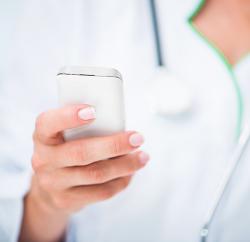

The survey findings offer examples of the progress made and hurdles that providers face when integrating mobile technologies into their facilities to improve patient care. Respondents indicated that the top benefit to having mobile technologies in their facilities was increased access to patient information and the ability to view data from a remote location. Funding limitations topped the list of barriers.
Survey questions were designed to align with the six areas of the mHIMSS Roadmap, a strategic framework for providers to implement mobile and wireless technologies. These areas — New Care Models, Technology, ROI/Payment, Legal & Policy, Standards & Interoperability and Privacy & Security — represent the focus for healthcare organizations when developing and implementing a mobile strategy.
“The mobile health market is one of the fastest growing areas in the health IT space. We recognize the growing importance of mobile technologies and its impact to transform the delivery of patient care,” said David Collins, senior director of mHIMSS. “The Survey reflects mobile technology as a transformational tool, as demonstrated by nearly all of the respondents supplying mobile technology to clinicians.”
Among the results:
Legal & Policy
- 59 percent have a mobile technology plan.
- 29 percent are developing a mobile technology plan.
- HIPAA is the federal legislation that is most likely to impact organizational mHealth environment.
Privacy & Security
- 95 percent use at least one security tool to secure data on mobile devices.
- Passwords are the most widespread security device in place.
New Care Models
- Clinicians are most likely to use technology to support patient care by either: Looking up patient information; or Looking up non PHI (personal health information).
- For the second consecutive year, pharmacy management topped providers’ lists as the most likely use of mobile technologies, including medication reminders or medication reconciliation.
Technology
- App development is mostly handled by vendors or third party vendors.
- More than half of provider respondents indicate they would expand their use of apps in the future.
- One-third of respondents offer apps for patient/consumer use, up from 14 percent a year ago.
- 62 percent indicated that they offer patients access to at least one of the mobile tools identified in the research, including patient portals, telehealth services and remote monitoring devices.
ROI & Payment
- Just half formally measure ROI related to their mobile technology investments.
- A mere third of respondents evaluate the total cost of ownership as it relates to their mobile strategy.
Standards & Interoperability
- Only 22 percent indicated that three-quarters of the data captured by mobile devices was integrated into the organization’s EMR.
- Most respondents can access data from clinical systems via mobile devices and clinicians are the most like to do this via Internet access using a VPN.
- More than half of the respondents indicate that alerts/notifications from remote monitoring devices are delivered via an EMR/clinical system alert.
(mobile tech and doctors / shutterstock)